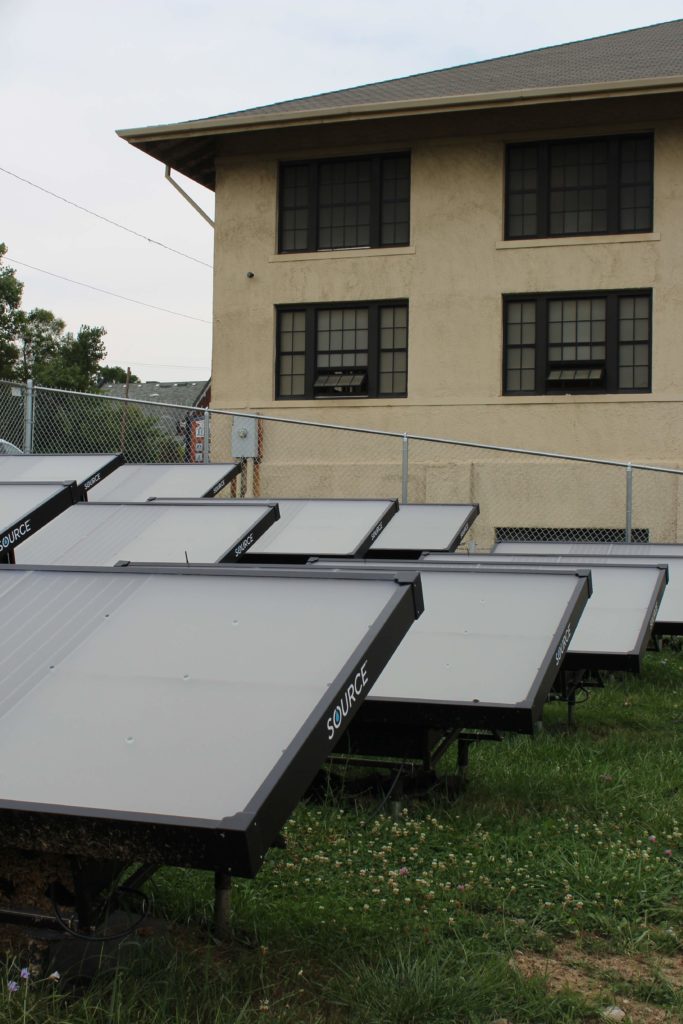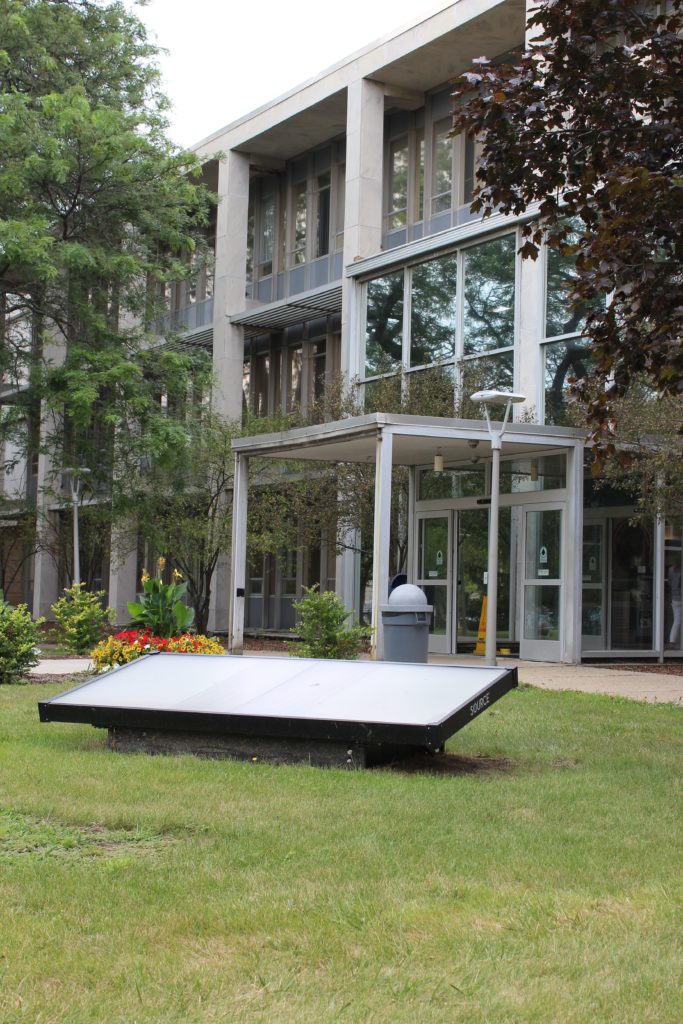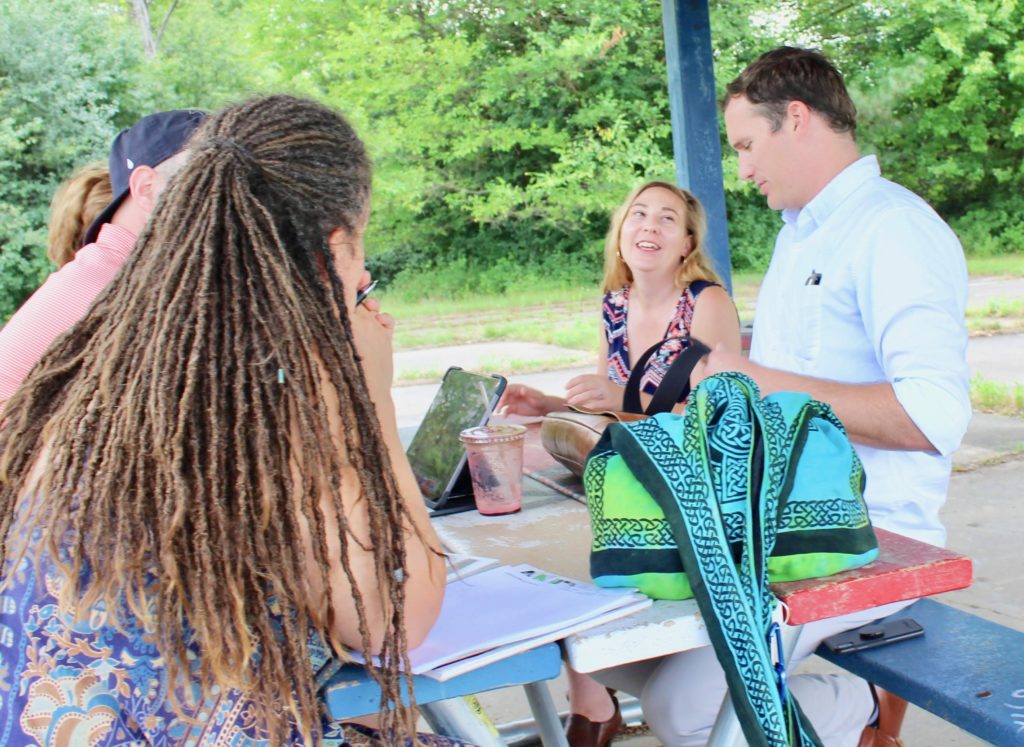By Melodee Mabbitt
Neighbors voicing their concerns prevented Pierce Park from becoming the location for a private company to install up to 1,000 solar panels and a bottling facility on Flint’s public land in order to produce bottled water for sale.
Zero Mass Water, a water technology company that uses solar panels to make “drinking water from sunlight and air,” contacted the president of the College and Cultural Neighborhood Association Mike Keeler on Aug. 14 seeking support from neighbors for their proposal to locate in Pierce Park.
In response to the request, College and Cultural Neighborhood Association (CCNA) leaders quickly arranged a meeting for all neighbors to hear from Zero Mass Water, ask questions, and decide for themselves if they wanted to support the company’s investment in Pierce Park.
As news of the meeting and its purpose spread, the company received so many concerns from neighbors that they dropped the park altogether as a potential location and canceled the meeting the night before it would have taken place.
“The CCNA community has been incredible over the last few days, meeting with our team and providing their feedback and recommendations,” said Brand Director for Zero Mass Water Kaitlyn Fitzgerald in an email to EVM. “After consulting with a few community leaders, we’ve decided to look at other sites. Right now, we’re still early on in the process of identifying land, so we’d love to come back and share more once we have updates.”
With Pierce Park off the list of potential public land for the company to occupy and the company’s presentation to the neighborhood canceled, concerns linger.
“We wonder how did we get this far in the process, and there has been no public hearing?” Keeler said.
How Zero Mass Water arrived in Flint
Mayor Karen Weaver first announced the city’s public-private partnership with Zero Mass Water in January at CES 2019, a technology show in Las Vegas. She spoke about the role of water technology in the water crisis and her philosophy that Flint residents should directly benefit from investments in Flint’s recovery.
“We’re looking to be a water research hub in this country. We ought to be able to share our knowledge, experience, and expertise with other people around the country and around the world,” Weaver told a crowd gathered at the Zero Mass Water booth. “This is one piece of that puzzle.”

Zero Mass Water is headquartered in Scottsdale, Ariz., and sells a new system it calls SOURCE Hyrdopanels. Installing the recommended two hydropanels provides approximately 12 standard bottles of water per day and costs between $5,500 and $6,500 including shipping, installation, and tax, according to the company’s website.
In February, Zero Mass water signed a non-binding memorandum of understanding with the City of Flint and the Community Foundation of Greater Flint. It outlined Zero Mass Water’s intent to lease land from the city to build between 200 and 1,000 of their SOURCE Hydropanels with the purpose of bottling water for sale in the region, and calling it their “SOURCE Field.”
The company also agrees to use local consultants and contractors, provide employment opportunities in Flint, and allocate “a mutually agreed portion of SOURCE Water sales to Flint-based community projects.”
For its responsibilities in the memorandum, the city agrees to “jointly promote the marketing, distribution, and sale” of water bottled in Flint to “public and private institutions that are seeking to support economic development in Flint.”
It also agrees to host the hydropanel installations at Flint City Hall and Berston Field House pending funding from the Community Foundation of Greater Flint.
Zero Mass Water developing on city-owned land
Zero Mass Water installed its hydropanels at City Hall and Berston Field House without payment from any entities in the city.
And in a statement to EVM, Isaiah Oliver, president and CEO of the Community Foundation of Greater Flint, said, “The Community Foundation of Greater Flint has not made a grant or invested in any installations.”
Fitzgerald said Zero Mass Water has “absolutely not” accepted any payments from the City of Flint for the installations at Berston and City Hall.
“We have some ongoing conversations” about being compensated for the installations, Fitzgerald said, “but right now our focus is on developing our relationship with the community. So over the summer it was very important to us to have these installations to demonstrate our ability to provide clean and safe quality drinking water to residents in Flint.”

Zero Mass Water panels at Berston Fieldhouse (Photo by Melodee Mabbitt)
Berston Field House Director Bryant Nolden said they were honored to be the pilot site for demonstrating Zero Mass Water in Flint.
Berston is owned by the city and run by Friends of Berston, a non-profit created by Nolden in 2014 to keep the facilities open to the community during Flint’s emergency management era.
Zero Mass Water worked with local contractors to install 15 of its hydropanels next to Berston, which are hard plumbed to fountains in the building.
“With this water, we don’t have to wonder if the pipes are corroded because the water is pulled from the solar panels and filtered right into the building,” said Sheila Miller-Graham, operations manager at Friends of Berston.
Miller-Graham gave EVM a tour of the installation and a taste of the water produced there. It was cold and refreshing.
Miller-Graham said she is happy to have a clean source of water coming into the building where she can conveniently fill her water bottle.
“We have people from the community who come fill their bottles and take them home every day,” she said. To date, Berston has not run out of drinking water since the hydropanels were installed.

Panel at City Hall (Photo by Melodee Mabbitt)
Hyrdopanels are also installed at City Hall and collect into containers for use by city employees, according to Deputy Director of Economic Development for the City of Flint Linette Phillips, who coordinates the project with Zero Mass Water.
Phillips explained that the next step for the project was to install the “SOURCE Field” of 200 to 1,000 hydropanels at the Flint Water Treatment Plant.
Council approved a lease agreement between the City of Flint and Zero Mass Water on June 10 with a 6 to 3 vote. Council members Kate Fields, Ward 4, Allan Griggs, Ward 8, and Eva Worthing, Ward 9, dissented.
The lease required Zero Mass Water to pay the city a $750 per parcel monthly rent, starting with 10 parcels at the water plant.
How Zero Mass arrived at Pierce Park
According to Phillips, the city soon discovered that infrastructure underground at the Flint Water Treatment Plant would not hold the weight of a field of 200 to 1,000 of the 250-pound solar panel units. Plans for the company to locate at the water plant fell through.
“We would not move forward on this type of project without first speaking to residents in the neighborhood,” said Phillips. In early August, Phillips gave Director of Zero Mass Water Colin Goddard a tour of Pierce Park and recommended that he reach out to the neighborhood.
Goddard first approached the CCNA Aug. 14 seeking letters of support to present to Flint City Council on Aug. 21., according to Keeler.

CCNA neighbors Kristen Nix (left) and Desiree Duell meet with Colin Goddard of Zero Mass Water in Pierce Park (Photo by Melodee Mabbitt)
“He wanted us to get a few neighbors together to hear about his proposal and asked if we write letters of recommendation from the neighborhood,” Keeler explained in an email to EVM. “This issue affects much of the neighborhood, and we think they all need to have the opportunity to weigh in.”
So at Keeler’s insistence, Goddard agreed to postpone the Aug. 21 presentation to council and instead worked with Keeler to arrange a special presentation to the neighborhood on Aug. 22. Goddard requested that the association provide neighbors with his cell number so that he could be reached directly.
Over the next few days, Goddard answered calls and met with neighbors. Meanwhile, emails and calls poured in to the neighborhood association.
Zero Mass Water meets Flint’s College and Cultural Neighborhood
According to Vice President of the College and Cultural Neighborhood Association Sherry Hayden, neighbors who contacted the association were concerned about issues including what impact it would have on Pierce Park, whether it was legal to lease the park to a private company, questions about the company’s technology and business model, and complaints that the city’s lease agreement excluded financial and liability protections for city interests.
Laura Mebert, assistant professor of social science at Kettering University and a CCNA resident, emailed EVM to share her concerns about industrial use of the park.
“This city has SO much abandoned industrial and commercial space. How does it make sense for a company to build over our public green space, instead of repurposing abandoned spaces that have already been built up or paved over? While covering up our green space would take something away from our community, building on an abandoned space (such as the parking lot of an abandoned Meijer or Kmart) would contribute something to it,” Mebert wrote.
The CCNA shared copies of portions of two of the anonymous complaints they had received from neighbors.
One cited sections of the city charter that prohibit park land from being diverted to any use unless approved by voters.
Sec. 4-507 PROHIBITION ON SALE OF PARK LAND.
No City of Flint owned land which is in use as a park or was used as a park shall be sold, transferred or diverted to any use unless approved by a majority of the electors voting thereon at any general or special election. A public hearing shall take place no less than 90 days prior to placing the issue on the ballot
Another concerned neighbor shared a YouTube video claiming to debunk Zero Mass Water, calling it a “dehumidifier that you stick in the garden.”
Laura Sullivan, a Kettering University professor of mechanical engineering, told EVM that sticking a dehumidifier in the garden is actually a legitimate way to collect water and many water collection systems use this approach.
“Currently, solar panels may not be the most effective technology to power this type of collection system, but renewable energy would be a more environmentally friendly approach than using fossil fuels,” she said. “If the goal is to research possible systems, this system is worth exploring.”
On Aug. 20, Desiree Duell met with Goddard at Pierce Park. Duell, a local artist and water activist, is in the beginning stages of creating a project in Pierce Park called Sanctuary. She said she did not believe a decision could be reached about the impact of the hydropanels in the park without a prior environmental assessment.
Duell also shared the city’s master plan with Zero Mass Water and pointed out the green innovation zones, which do not include Pierce Park. She said the company seemed unaware of the master plan.
The next morning, the company pulled out of the neighborhood and the association hustled to let neighbors know the meeting with Zero Mass Water was canceled.
“Once Zero Mass Water was separated from parkland, some people we spoke with were more open to the idea of the business at a location that would make more sense,” said Hayden.
Zero Mass Water officials say they continue to look for an appropriate Flint location.
EVM Staff Writer Melodee Mabbitt can be reached at melodee.mabbitt@gmail.com.


You must be logged in to post a comment.